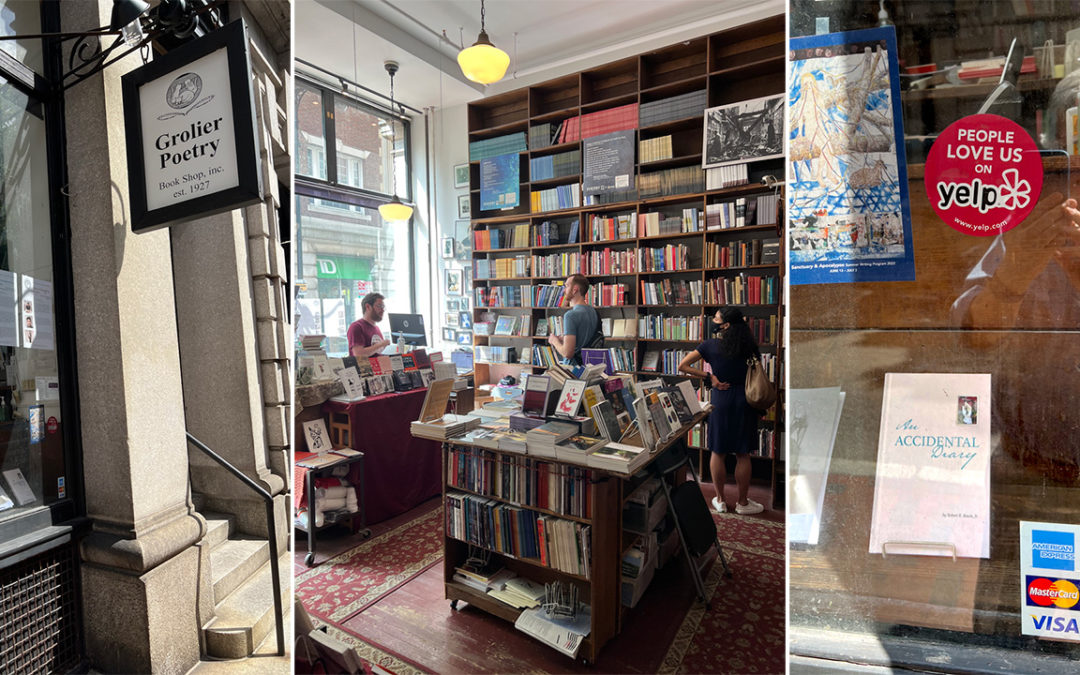
by Robert Bowie, Jr. | May 31, 2022 | Featured, Poetry
As a young boy, I lived in the sports pages and played on sandlot baseball diamonds after school. I dreamed about the big leagues. My dreams and my future were one.
As a young man, things became a little more complicated.
I couldn’t really hit a curve ball and I started noticing that the second question that people asked grown-ups after their name was “What do you do?”
Businessman? Doctor? Lawyer? With high school, a wider and more terrifying world was opening up.
I stumbled on T.S. Eliot and his poem, “The Love Song of J. Alfred Prufrock,” in which he wrote about the early 20th century. It is set in Boston’s Beacon Hill.
It seduced me from my fading childhood into my predestined future with its opening lines:
Let us go then, you and I,
When the evening is spread out against the sky
Like a patient etherized upon a table;
Ezra Pound pronounced this poem as “modern” — part of the dark reality of the new century and its new poetry. And so it was for me, standing there, in the Grolier Poetry Book Shop with J. Alfred Prufrock in my hand, a freshly minted teenage groupie at a one-room bookstore with towering bookcases.
Grolier was intimidating, but it held a world of new alternative heroes as I was losing my childhood and falling into the shadows of some job that would define me when asked “What do you do?”
How did this happen?
Posted on the front door of Grolier Poetry Book Shop was a blunt sign: “No Law. No History. No Economics. No Biology. No Physics. No Chemistry. Only Poetry!”
Gordon Cairnie, one of the founders, would sit on an old couch and hold court with published poets who were different in every way than the people I knew.
He waited for some unsuspecting student to walk in and ask if the store sold law books or the like.
Gordon would unload on the innocent walk-in and turn all the heads of the browsing readers when at the top of his voice he would answer, “No! But what difference does it make to you because you can’t even read the sign!”
Everyone would laugh in this freshly reconsecrated space and the young student was sure never to return again.
The point of entry to this new world was the “dare to be different” commitment to admit out loud that you were a poet and a believer, not a tourist.
I was way too shy.
This was a lot different than sandlot baseball, but within it there was still room to dream.
Over the years, the Grolier had become a focus of poetic activity in the Cambridge area, itself a magnet for American poets because of the influence of Harvard University. Poets such as John Ashbery, Robert Bly, Robert Creeley, Donald Hall, and Frank O’Hara were regulars at the store during their time as undergraduates at Harvard. The poet Conrad Aiken lived upstairs from the store in its early days.
Numerous other poets and writers are noted as “friends of the Grolier,” including Russell Banks, Frank Bidart, William Corbett, E. E. Cummings, T. S. Eliot, Lawrence Ferlinghetti, David Ferry, Allen Ginsberg, Denise Levertov, Marianne Moore, Charles Olson, Robert Pinsky, Adrienne Rich, Ruth Stone, James Tate and Franz Wright, to name just a few.
The bookstore claims to be the oldest continuous bookshop devoted solely to the sale of poetry and poetry criticism.
This September it will be 95 years old.
I was committed to keeping up with the rest, going to law school and succeeding — and I did. But I couldn’t forget the voices at Grolier and my prior fear of admitting out loud I wanted to be a poet.
When my travels would lead me to Boston, I would always go back to make sure it was still there. I would always buy a book or two to justify my visit and my love of lounging there for awhile.
Last Saturday, I was in Cambridge. I brought two copies of my first book of poems, An Accidental Diary, to give to friends I planned to see.
That morning in the hotel room, an idea hit me. I looked up the Grolier Poetry Bookstore and before I let better judgment kick in I called and asked for the proprietor, James Fraser. I told him I had two copies of a book, explaining one poem was runner up for the Robert Frost Foundation Poetry Award and another had been chosen for an upcoming anthology in Baltimore. I asked him if he would consider putting them up for sale on the shelves.
I told James I had been going into the bookstore for over 50 years and had studied with Professor William Alfred and Elizabeth Bishop whose books were on the shelves and pictures on the walls.
He invited me to drop by. I immediately walked my two books over and told him more of my story. I encouraged him to read “Summer Thunderstorms” and “The Facts of Life” to show the range of the work.
He leafed through the book as we continue to talk. There were a few people browsing as there always are and I took a moment to take a deep breath and just be surrounded by the place.
James looked up and smiled. He took both books out of my hand, looked up at me again, took one for the shelf and then put one book prominently in the front window.
Things this wonderful don’t really happen in real life but sometimes they do.
When I walked back to the hotel empty-handed looking down at the pavement with a stupid grin on my face, I felt like I had circled the bases on the sandlot!
I had always dreamed about the big leagues. But after a very long time my dreams and my future were again one.
(“An Accidental Diary” is also available on Amazon in paperback and Kindle.)
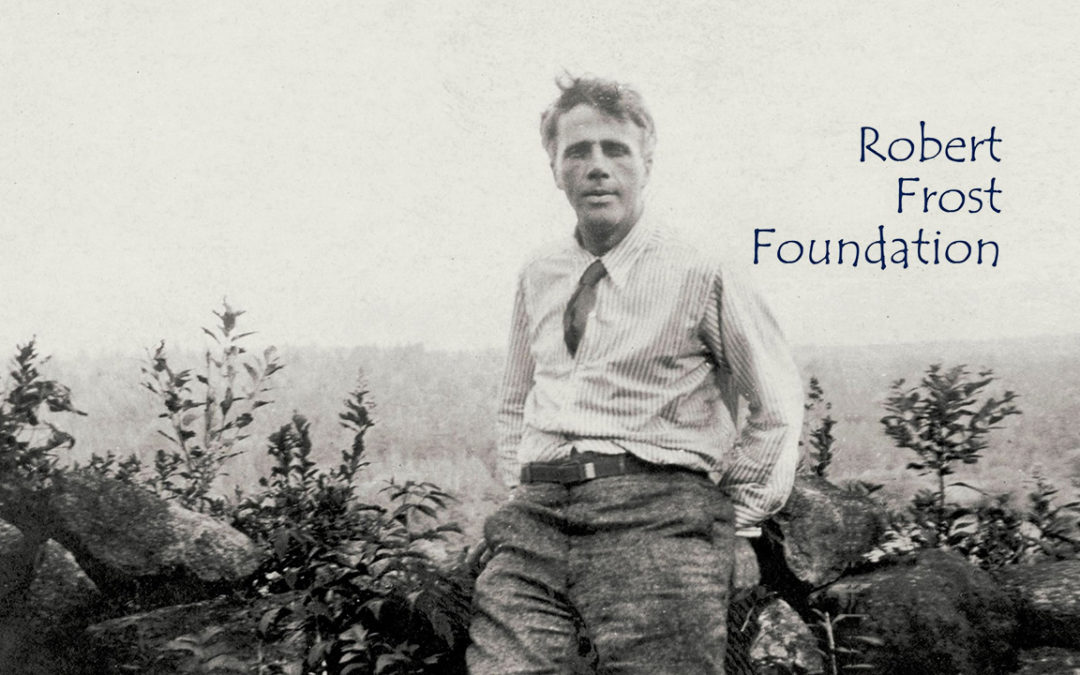
by Robert Bowie, Jr. | May 17, 2022 | Personal, Poetry
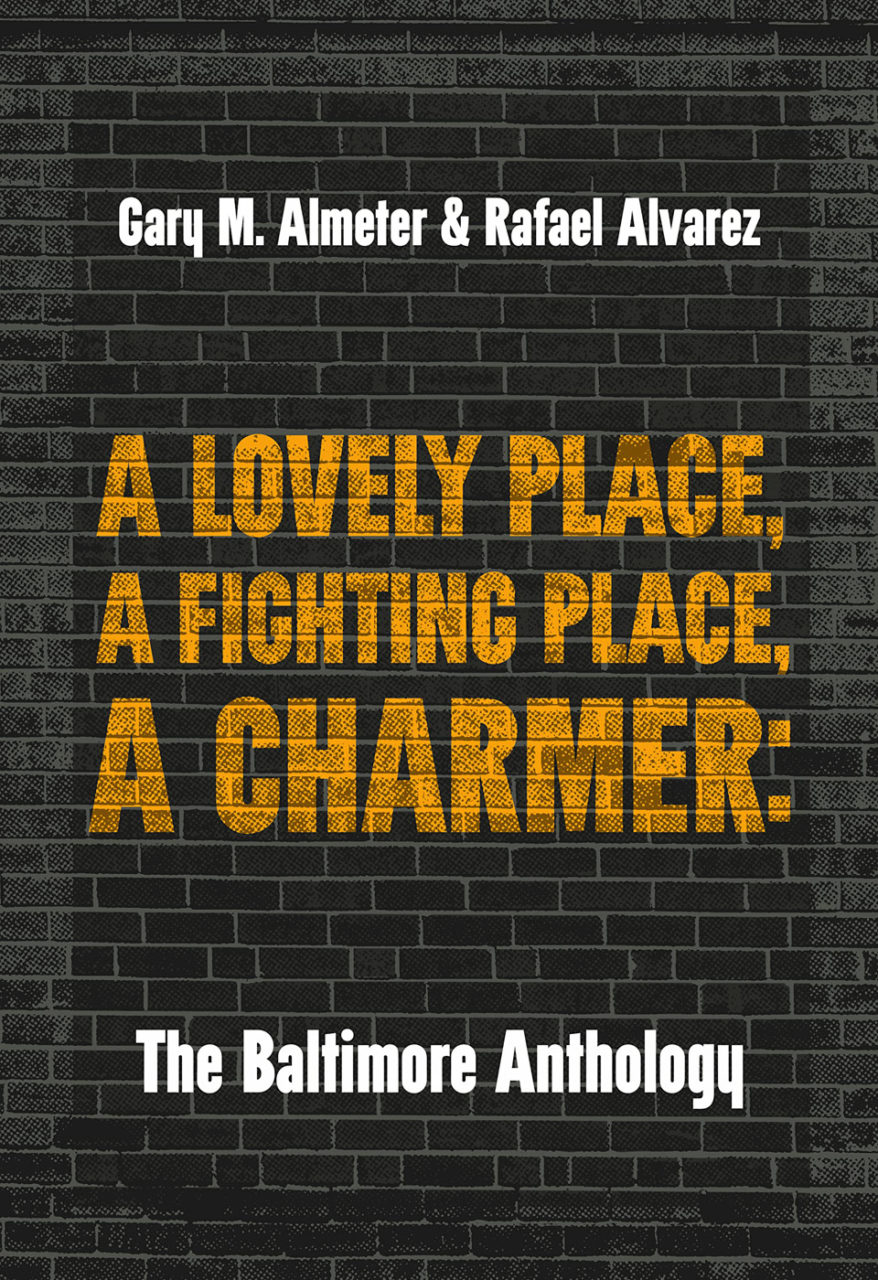
I started this blog several years ago in an effort to explore if there could a professional life in the arts after a full and satisfying first career.
Yesterday, I was notified that I had been chosen as a runner up for the Robert Frost Poetry Award for 2022 for my sonnet, “Summer Thunderstorms.” and last month, my sonnet, “City Snow,” was chosen to be included in the upcoming Belt City Anthology: A Lovely Place, A Fighting Place, A Charmer: The Baltimore Anthology.
Both entries are from my book, An Accidental Diary: A Sonnet a Week for a Year.
Help me celebrate and prove that there is the second life, after all!
Please buy a copy of these books and give them away, and ask that they be re-gifted by order of the author.
Here is the Robert Frost Foundation entry:
Summer Thunderstorms
As with the generations long since dead
The fire and brimstone of the status quo
Wakes him up from the safety of his bed
And lightening frames him in the window
And photographs him in its afterglow.
Tonight he feels his present and its past
As the summer storm also comes and goes.
Conclusions are foolish in a world so vast.
For at the edges of his world and heart
Far past the farthest boundary of his grasp
Where ideas cause worlds to come apart
He lives in this place that will not last.
He loves his life more than he can explain
And leaves the window open to hear the rain.
“Week 35” from An Accidental Diary
(Available now on Amazon in paperback and Kindle.)
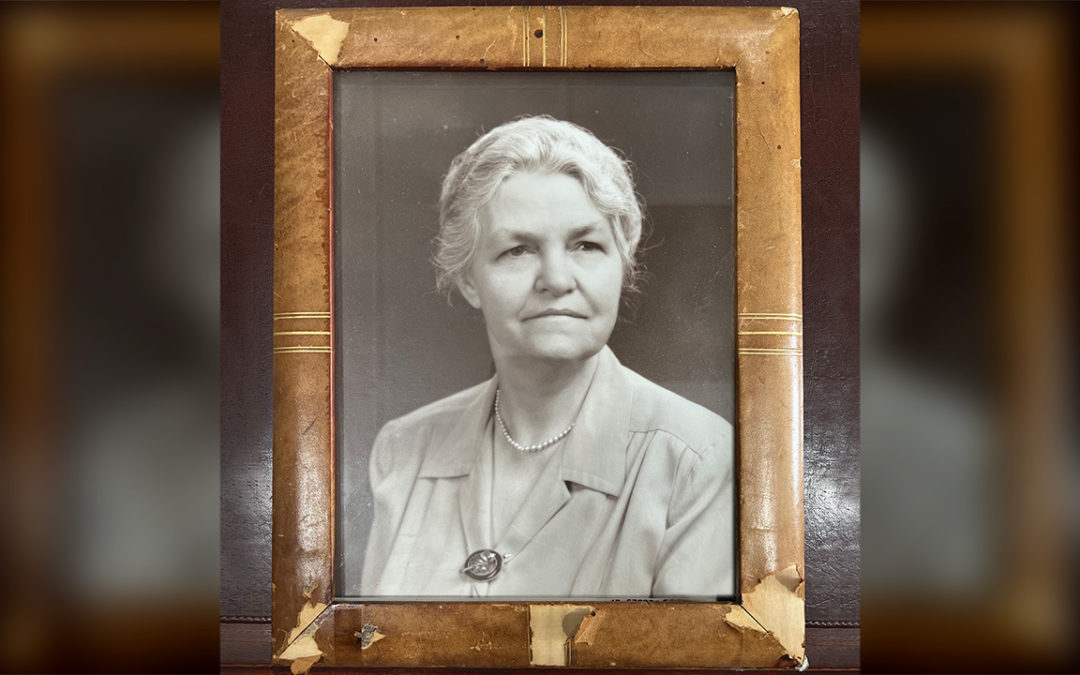
by Robert Bowie, Jr. | May 3, 2022 | Featured, Personal
Last week I posted a piece about my mother and how my grandmother would whistle her chickens home long ago on a farm on the eastern shore of Maryland and how my mother, not quite so long ago, used the same whistle to call her children.
My grandmother was the only grandparent I would know. She lost her husband and the farm when my mother was still in high school.
Even though we always lived far apart I remember as a small child feelIng our inexplicable mutual affection when I would wish her happy birthday or Merry Christmas each year over the telephone.
Both my grandmother and my mother had a kindness that children almost Intuitively recognized as safe.
While the schools taught reading, writing, arithmetic, and how to compete in the modern world, my mother and grandmother’s universe was quite the opposite. It was more gentle. They focused on the wellbeing of those they loved. Their world was often damage control.
I was lucky to have known them.
In fourth grade the family moved back to Boston from Washington, and I started my 4th new school in four years. That summer I had developed a temperature of 104 and was taken from Randolph New Hampshire down to Mass General hospital to see Dr. Gross, a specialist in children’s lung problems.
The lower lobe of my left lung was removed which delayed my entrance into a new fourth grade class in which I would already be far behind because of the learning issues that had followed me from Washington.
The following summer I had to meet with tutors every day in order to be bumped up to the fifth grade, I had finally given up on school and slowly started to recess into myself and my gathering emotional despair.
In August, I got a break from the tutoring before fifth grade started.
The next thing I knew, I was scheduled to visit my grandmother in Chestertown, MD for the first time.
My grandmother was in her early 70s and lived alone in one of two small apartments on the 4th floor in an old building next to the bridge over the Chester River, which brought slow moving cars and rattling trucks in and out of Chestertown.
That first evening together, we ate a simple dinner on the card table. Then we went down the fire escape to the backyard with a jar with ice pick holes for air in its tin screw top to catch lightening bugs. Later, when the lights were out, they would be let loose in my room.
Like her daughter, Granny — which is what she wished to be called — had the softest paper-thin skin as she aged but maintained rough dishpan hands, which were perfect for back rubs.
I remember that first night being tucked into bed in an envelope of fitted sheets all alone in the darkness with the lightning bugs.
Somehow my tension disappeared into a quiet world that was my grandmother’s domain.
The next morning she vested me with adult authority. After an early breakfast of griddle cakes with maple syrup, grits, and kettle tea (kid’s tea — milk and sugar but no teabag), it was unspoken but somehow understood that I would be carrying my side of the responsibility by doing the dishes.
At breakfast she planned our day. We would be walking into town to do her errands and I would buy a simple fishing pole, some hooks, a tin pail to hold a small pocket knife, extra lines, some worms, and a red bobber that would flip over and pop up if I got a bite from one of the catfish that the old men routinely pulled out of the Chester River from off the bridge.
Granny had this uncanny ability to create an adventure and treat it like the business of life. She told me not to bother the old men who were fishing but be nice to them if they talked to me.
The men left me alone but they had stopped laughing together and focused on their fishing quietly as they occasionally would look over at me.
As I caught nothing, they caught several big catfish and I was envious. Slowly one of the men came over and asked if I would like some advice. I politely said yes and he pulled in my line, replaced my worm with bait from his pail, put on a sinker, and let the line drop into the brown water until it hit the bottom. Then he reeled it up so that the bobber would react to bites from where the catfish lived.
At the end of the day when everyone left the bridge, I left with them.
Midway through dinner, I proudly announced that I had made a friend. Without looking up, Granny asked, “was I polite?“ I assured her I was, which added to my sense of accomplishment, but I told her I did not catch any fish.
She said that she had done all the shopping that was necessary for our week, so I should be sure if I caught a fish to make sure that I gave it to my new friends. After dinner, and after I had done the dishes, because the sun had not yet gone down, we played slap jack on the folding table and I got pretty good at slapping jacks.
As the sun went down we repeated our collecting of lighting bugs for the room, and the next morning I repeated the day before, but this time with a little more self-confidence. My grandmother told me to leave my windows open so the lightning bugs could rejoin their friends before the next upcoming night.
The men were already on the bridge when I walked up to join them with my pail and fishing rod, and they welcomed me. They clearly had been talking about me after I left them the day before.
I was proud that I had been polite and that they seemed to like me. Within an hour of meeting them, I caught a fish and it was pretty big. They showed me how to remove the hook from the big catfish’s gaping mouth and I dropped it into one of the burlap bags.
The friendships increased into gentle humor, which was respectful on all sides but fun. That night we repeated the night before except my grandmother was laughing when I returned home, because she said that her downstairs neighbor had stopped her on the stairs to let her know that I had slapped a jack so hard the pendulum had come off of the grandfather clock in the apartment below.
I went back to school that fall and continued to fail, but I was less hesitant to call my grandmother just to talk but never to complain. We never talked about anything important but somehow we did.
Later that year, my mother left Boston hurriedly one morning to go down to Chestertown and I grew worried but couldn’t speak.
When I got home from school, my father was waiting.
I told him I was worried about my mother. I wanted to call my grandmother but he took me into the living room and held both my hands in his and said, “you can’t call her now. She has died.“
That was well over 60 years ago. We would both be about the same age now.
Even now, there are still times when I feel that I want to call her but somehow I can’t seem to find the number.
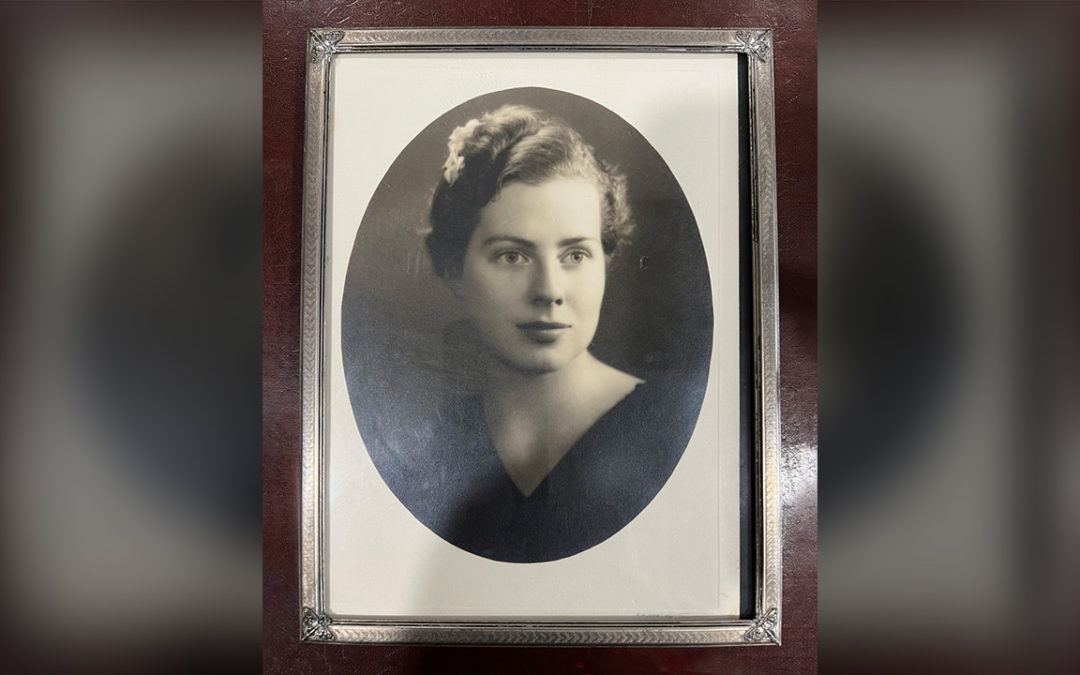
by Robert Bowie, Jr. | Apr 26, 2022 | Featured, Personal
My mother was a quiet country girl. Even in the suburbs, she used the exact same whistle that her mother used to call the chickens when she wanted us home for dinner.
She married a strict but loving patriarch and had two sons. The three males all believed they were the center of the universe. When she died almost 15 years ago, she left an unexpected void in her place.
The three men she left behind slowly came to recognize she had been our gravity. I don’t think I could have understood her while she was still alive. I think she knew that.
The year she died, she gave me a large steamer trunk, which she told me she had filled with the flotsam and jetsam of my very “learning disabled” childhood. She told me she had saved everything, beginning with kindergarten through when I passed the bar exam and she pronounced I was on my own, “because finally you will never have to take another test again.”
It had been our war, which we fought side by side, against a world eager to write me off, forget me, marginalize me and perhaps us. Because I did not wish to return to that nightmare, I was never ready to open that box.
My mother had no fear of time. She had endless patience.
Because we lived in a patriarchy, we knew all about our family name, with its politicians, governors, distinguished lawyers, and Maryland history. But my mother‘s family of farmers and merchants on the eastern shore of Maryland with its southern roots was rarely discussed.
The year before she died in her mid-90s, she asked me to drive her down to Church Hill, Maryland, where her family of Chapmans, Valiants, and Faithfuls were buried around a small church in an agrarian tidewater town. She said she wanted me to see where she had come from. She had already given me the box by then.
As I recuperated from surgery over the last few weeks, I kept looking at that box. Last Sunday, I opened it.
As I gently pulled back the wrapping paper, I was surprised to find more than I expected. There were pictures of her relatives and ancestors who I had never really known. On the back were the names and dates and a few sentences about who they were and how they connected to my mother and our family. As I put the pictures up on the table and found them staring back at me, her life slowly formed around her in a way that included me.
I noticed that I looked like them more than I looked like my father’s family.
Her father loved poetry and the arts. He had been a choral master and led singing groups and church choirs up and down the eastern shore. There was a beautiful hand-crocheted bed cover, and a white embroidered tablecloth made by her mother, and more pictures of her two older brothers whom I barely knew.
At the very bottom, piled in chronological order and bound by a rubber band that had long since broken, were all of my teachers’ reports. They started with kindergarten reports of a joyous, adventurous, somewhat shy little boy who the teachers found “amazing in his creativity and interest in the world,” until the alphabet and reading and spelling were introduced in first grade and then the failures compounded year after year, as that little boy fell further behind, repeating grades or advancing to the next grade only if he would go to summer school, then encouraged to leave and go to another school, and ultimately to be told he could not go to college.
My mother was patient. My mother had no fear of time. She got me to dictate stories to her as I thrashed on the bed in the vacant third-floor room. She got me to write poems.
Each day after school, she made it her business to read all of my homework assignments to me as we curled up in a window seat, the afternoon sun pouring in through the windows. It didn’t really help, but it was all she could do and she refused to give up on her disappointing son who was always falling behind.
My mother had no fear of time. She had endless patience.
We were all too self-centered to ever recognize who she really was. We all loved her, that was never an issue. But I am now convinced that when she went off to church alone on Sundays, that was something more than her quiet time.
After I spent better than a day with everything spread out on the dining room table, I finally closed the empty trunk. It had been a time bomb to be opened when I could finally understand it. It was an explosion.
Over the years, my father and my brother grew to realize that she had a unique relationship with each of us that was powerful and the source of the gravity that brought us all together. The trunk did not hold the history of my failure as I had thought it did. It held the history of our love as it had matured with faith and quiet determination, year after year, growing strong dispute life’s pressure.
My mother was patient. She had no fear of time.
She waited until I found a voice outside of failure, my family history. She trusted I would find that voice and make it my own. She waited until I found the arts in her family and in me. She waited until last Sunday to be more fully recognized.
There is a poet I love named Philip Larkin (1922-1985). He wrote a quiet poem that stopped me in my tracks when I first read him in college:
The Explosion
by Philip Larkin
On the day of the explosion
Shadows pointed towards the pithead.
In the sun the slagheap slept.
Down the lane came men in pitboots
Coughing oath-edged talk and pipe-smoke,
Shouldering off the freshened silence.
One chased after rabbits; lost them;
Came back with a nest of lark’s eggs;
Showed them; lodged them in the grasses.
So they passed in beards and moleskins
Fathers brothers nicknames laughter
Through the tall gates standing open.
At noon there came a tremor; cows
Stopped chewing for a second; sun
Scarfed as in a heat-haze dimmed.
The dead go on before us, they
Are sitting in God’s house in comfort,
We shall see them face to face–
plain as lettering in the chapels
It was said and for a second
Wives saw men of the explosion
Larger than in life they managed–
Gold as on a coin or walking
Somehow from the sun towards them
One showing the eggs unbroken.
There are times when it takes so long to understand the depth of one’s love you almost lose the chance to say thank you. If I shut my eyes, I can hear my grandmother and my mother calling the chickens home.
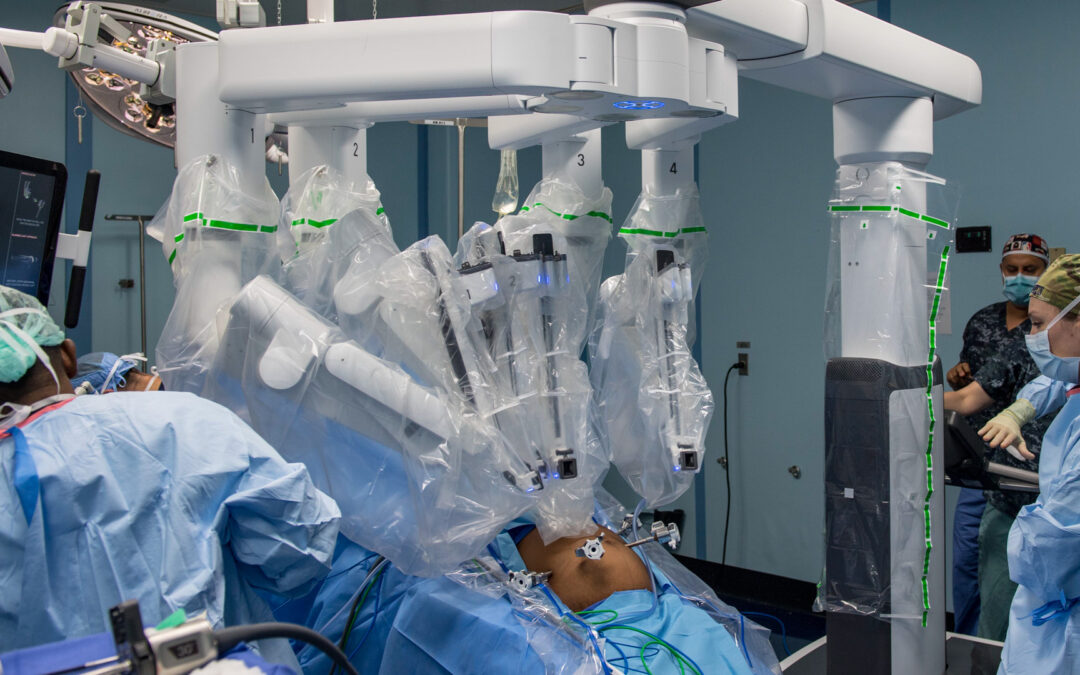
by Robert Bowie, Jr. | Apr 12, 2022 | Featured, Personal
This can’t be real but it’s happening anyway…?
Last week I missed my Tuesday @ 3 posting.
A friend told me, “As you go into the operating room, don’t look at the ceiling because it’s like you’re underneath a giant spider. The legs come down when they do robotic surgery. The doctor isn’t even in the same room.”
This can’t be real but it’s happening anyway?
Then he said “You’ve got to be ready to block it out. Before you go in, give yourself a question to think about and then think about working on solving it all the way through your time in the hospital even through the anesthesia. You will be an unreliable narrator and your answer might make no sense, but you’ve got to be ready to block it all out.”
The operating room doors opened and they pushed my bed to the center of the room. Several nurses were setting up under very bright lights but they had their backs to me. The second hand took baby steps on a wall clock until the minute hand hit exactly 6:45 am.
I didn’t look at the ceiling.
My thoughts turned to my eighth-grade hockey team’s first victory. We were joyously riding back in a school bus in full celebration. The coach was in a separate car and the bus driver had lost all authority on the bus.
There was a ruckus in the back. I turned to see one of the boys secretively drop his pants and moon the late afternoon traffic. I realized that his audience was not the following traffic. It was the boys on the bus.
I was unprepared. I had no question to work on as the anesthesia dripped through tubes into my arm.
Moments later, I blinked into consciousness and I saw my doctor, not the surgeon, saying to me, “you probably won’t remember this, but I came by to let you know they got all of it and it hadn’t spread.”
As I fell back to sleep, l focused on the jukebox in the basement bar I worked in during college. One night, I discovered that from behind the bar I could control the volume of the music and the dimmer for the lights. And that if I made strong drinks, turned down the lights and turned up the music, all that was missing was a high wire act.
Around 2 o’clock the following morning, I woke up and tried to roll over but I was unable to move. I was lost in a tangle of catheters and drainage systems with little bags hanging from a carriage on wheels. I could not move. I had become claustrophobic.
The night nurse reassured me that she also suffers from claustrophobia. She told me it would be good if she helped me out of bed, and I walked up and down the well-lit hall, slowly pushing the carriage holding the dripping bags that flowed into me.
I did laps and more laps, past night nurses who drifted in and out of rooms as they gathered blood pressure statistics and temperatures and returned to their computers like bees to their hive.
I read the patient thank you notes posted on the walls and looked at the list of this month’s birthdays, all in the gentle murmur of motion past midnight.
Everyone left me alone to work out my demons by myself, and I recognized we live in an ever-changing atmosphere our whole life.
Finally, I returned to bed to realize that over the last half an hour while I was walking, my gown had been lifted and snagged to expose my bare bottom to the world and I wondered… is this connected? And then I broke out laughing — fresh beautiful laugher — just because I knew I was alive.
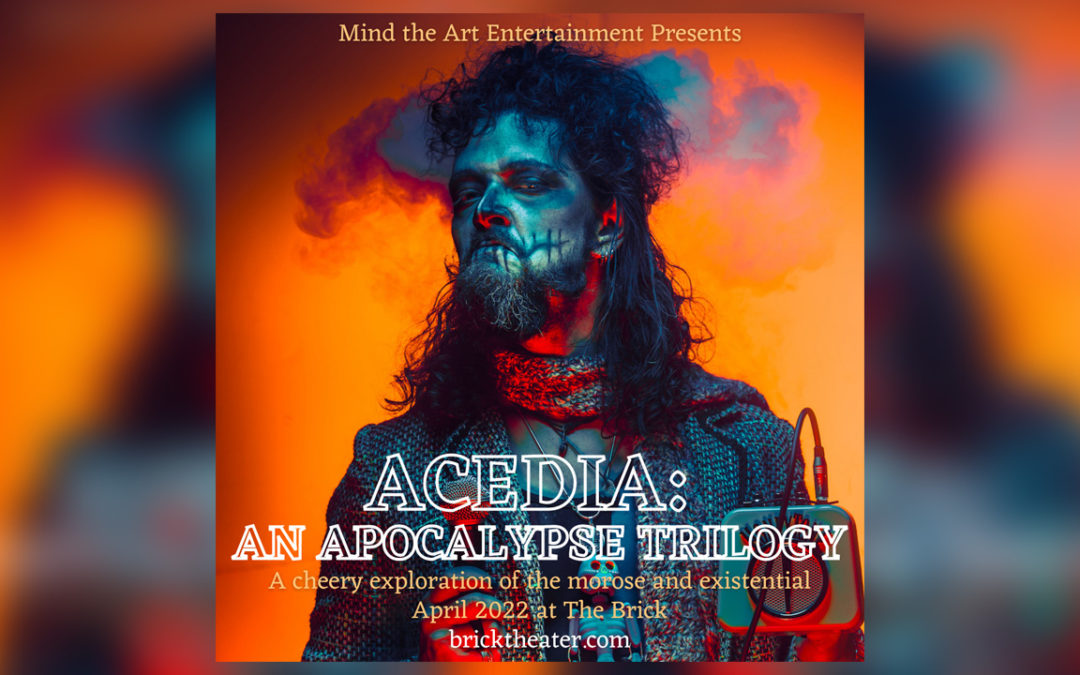
by Robert Bowie, Jr. | Mar 29, 2022 | Operetta, Plays
Friends, this week I’m featuring an upcoming NYC production I’m excited about, which was written, composed, and produced by my dear friend Christian De Gré Cárdenas, and co-produced and directed by Brian Freeland:
On April 13, Mind The Art Entertainment (MTAE) is opening ACEDIA Part 1, Part 2, and Part 3, which run until April 30th at the Brick Theater, 579 Metropolitan Ave., Brooklyn, NY 11211. Saturday performances feature all three parts as a trilogy.
You can learn more and get tickets here: https://www.bricktheater.com/mind-the-art-entertainments-acedia/
The three plays, which each run less than 90 minutes, can be seen individually over several days or in chronological order in one day.
A Cheery Exploration of the Morose and Existential
Sappy Tales for a Frozen Heart (ACEDIA Part 1): Set before The Apocalypse, can a broken man find humor and meaning as he listens to tales of romance on an old radio in an isolated cabin as the world comes to an end?
Fish Food for Feelings (ACEDIA Part 2): Set on the eve of The Apocalypse- Four adopted siblings meet at an abandoned cabin on the 2nd anniversary of their parents’ death for a surrealist dueling sibling dramedy unraveling during the end of the world.
Sent from Ampathy, miscreated by a non-writer (ACEDIA Part 3): Set after The Apocalypse, a Wisp, a Tuft, a Lint and a Dandelion float in a broken, meaningless, post-apocalyptic world as a deranged Listener seeks to reinvent art, purpose and connection.
Christian De Gré Cárdenas has emerged as one of the most influential contemporary voices in the development of new works in New York City. He has spearheaded numerous international projects in film, theater, television, music, publishing, web-media, fine-art and radio such as “Fatty Fatty No Friends” (FringeNYC Excellence Award Winner, Innovative Theater Award Nominations for Best Music and Best Musical, New York Musical Festival Best of Fest Concert, National Alliance of Musical Theater Semi-finalist, Time Out New York Critic’s Pick), “Beware The Chupacabra” (FringeFAVE, FRINGE ENCORES), and “Whiskey Pants: The Mayor of Williamsburg” (Audience Favorite at FRIGID New York, Showscore Critic’s Pick, off-broadway premiere at HERE.
A self-taught composer/playwright, De Gré Cárdenas has written and produced 30 original award-winning plays, musicals, operettas, operas and song-cycles in New York City at world renowned organizations like Joe’s Pub at The Public Theater, Feinstein’s/54 Below, HERE Arts, and La Mama E.T.C. He has been commissioned to write music for The Discovery Channel, The Drama Desk Awards, The United Nations, The Alchemists, and The Mexican Cultural Institute of New York.
He is an alumnus of The American Academy of Dramatic Arts and The Broadway League’s Commercial Theater Institute and is a member of the Advanced BMI Lehman Engel Musical Theater Workshop. He is a Yaddo Colony and a SPACE on Ryder fellow.
Having served as the General Manager and Director of Operations at The New York International Fringe Festival for five years and as Artistic Director of Mind The Art Entertainment for over a decade, De Gré Cárdenas has overseen the opening of over 1,000 new theatrical productions.
In 2018 he was appointed Director of The National Opera Center in New York City and is currently serving as Chief Operating Officer for OPERA America, and Resident Artistic Director for Mind The Art Entertainment’s “The Alchemists” program, where he is developing 25 original works.
This promises to be a creative and unusual performance. You can learn more and get tickets here: https://www.bricktheater.com/mind-the-art-entertainments-acedia/
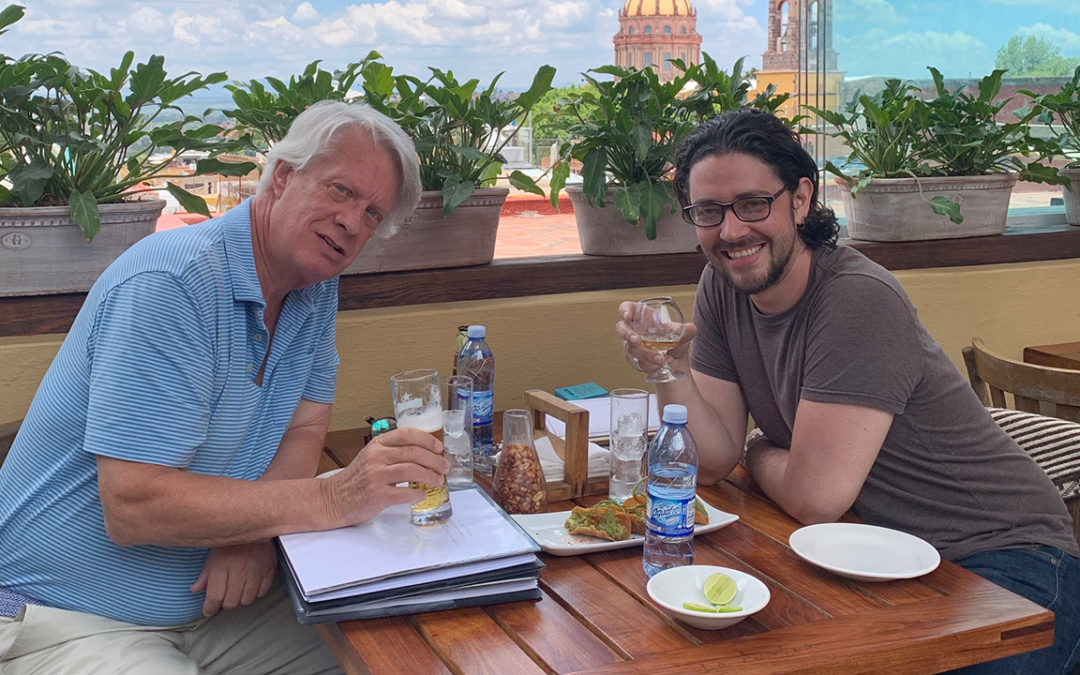
by Robert Bowie, Jr. | Mar 22, 2022 | FringeNYC, General, ONAJE, Operetta, Personal, Plays, Travel
Last Friday afternoon I took the train to New York for the sole purpose of seeing Christian De Gré Cardenas for dinner. The following morning I took the train back home to Baltimore. The only reason for that trip was because he is a friend I just had to see.
It was also a very personal post-Covid-lockdown tip of the hat to celebrate my belief that change is a gift from God.
After my first career as a business trial lawyer I decided I wanted to enter the professional world of theater in New York City, if I could in my late 60s and early 70s.
The only way to get across a chasm so deep was to jump.
Because I was old and no one would read my scripts, I decided I had to take an alternate approach. I decided to use my background as a lawyer so I read all the legal contracts required to be a producer and I took a class in producing theater.
All the young future producers started to ask each other what they wanted to produce. When it came to me I would say: “Nothing. I want you to produce me.”
After I had taken an introductory class at the Commercial Theater Institute in New York, I got a chance to go to the O’Neill Conference in Waterford, Connecticut for an advanced class so I could meet the future big shots.
That trip was a life changer. I hit a gold mine. I met three people within 24 hours who would change my life forever and are my friends to this day: Christian De Gré Cárdenas, Sue Marinello, and Aaron Sanko.
Today I want to talk about Christian and how he has changed my life for the better.
We both got off the northbound train from NYC in Connecticut in the early evening. We were picked up by a van driven by Aaron Sanko, who transferred us to a small motel where we would stay during the conference.
Aaron and Christian knew each other from the New York theater world. I was the old guy in the backseat who didn’t know anything or anybody who had instantly become a groupie.
The next day, Christian and I would be in the same class with Sue Marinello, and we have been bound together with Aaron Sanko ever since. I will talk more about these, my collaborators and friends, as we approach the opening of Mind The Art Entertainment’s (MTAE) upcoming performances, which will be premiering in April, July, and November in New York.
When Christian and I got off the train we looked like two Willy Lomans walking on stage in Death of a Salesman. After we were delivered to the motel and were waiting to register, I decided to talk to Christian and asked him if he would like to go get a drink after we checked in. He never got a chance to answer because the night clerk interrupted to tell us: “Forget about it. Everything is closed.”
Sue Marinello and I sat next to each other at the conference, and she committed to reading my play Onaje. Shortly thereafter, Christian suggested we apply to the upcoming New York Fringe Festival.
After the remarkable success of Onaje, Christian offered me a chance to write Vox Populi, his final operetta in a series based on the seven deadly sins. I immediately accepted and we agreed to meet at a restaurant in Spanish Harlem next to his apartment, where we would sketch out the plot and talk about the tone and temperature of this comedic operetta.
We had the restaurant to ourselves and the waiters brought us food and mescal throughout the afternoon, until the restaurant was set up for the dinner crowd to come in. It was magic.
I went back to Baltimore and went to work at a feverish pace and completed a rhyming rollicking first draft that Christian liked. He invited me to go to San Miguel de Allende, Mexico, to marry the music to the words.
Each morning we would get up and go to a little breakfast place that had a wide open garden with a little pond, a beautiful flowered fence, and a balcony with tables for breakfast. We were often alone as we started our day of work.
During breakfast we would go page by page editing the draft, and in the afternoon Christian went to work writing the music while I made changes to the script. Later in the afternoon, Christian would play back the music he had created. In the evening we went to magnificent restaurants in San Miguel and drank more mescal.
Around the plaza and the magnificent church, mariachi bands would sing for the locals, as well as the tourists, and we would walk the streets and listen for music coming from the rooftops. When Christian liked the sound overhead we would enter, go up the stairs, order another drink, and listen until we moved on to the next venue. It was magic.
When we got home at night Christian would go back to work, and in the morning, before we went to breakfast, he would play back what he had composed the night before.
This routine went on for well over a week and somewhere during that time we became brothers in creativity and laughter, and deep friends.
It is amazing how we all step in and out of unique worlds as we change careers or grow older. In my case, as my second career evolved and as I grew older, I stepped into an amazing world of people and experiences that have made me richer and more fortunate.
Unlike any profession I know of, the theater welcomes humanity into an opportunity for friendship in a way somehow the world cannot achieve.
During our dinner in New York last Friday, we were talking about something but I can’t remember what. I just remember Christian looking up straight into my eyes in a moment of surprise and saying: “Do you realize I am exactly half your age?”

by Robert Bowie, Jr. | Mar 15, 2022 | Featured, Personal, Travel
Over five years ago at the suggestion of a theater producer I started this blog. The idea was to build an audience by writing about my efforts to become a playwright as a second career after others my age had surrendered to golf.
In October of 2018 I got off to a good start with great reviews for Onaje at FringeNYC, but then in March of 2020 Covid shut the NYC theaters and I have been forced to report on other subjects as I have waited for the theaters to reopen.
But something wonderful has happened because of this misfortune. It has become another wonderful wake up call.
Two days ago, I found out that my friend Krzysztof saved a family last week at the Ukraine border of Poland.
Over ten years ago, I met Krzysztof at a Harvard Alumni Association gathering in Berlin. He was sitting in the hotel bar waiting for our bus to take us to a reception. I think it was the first alumni meeting he had ever attended. He didn’t know it, but I would be his friend before he was mine.
He stood out because he had all the crimson alumni materials and had decorated himself with a Polish flag as he held a drink in one hand and smoked a European cigarette with the other. I joined him, and to start a conversation I asked him what had brought him to Harvard.
He told me that after high school in Poland he had traveled as an immigrant to New York and was working in a Polish deli when a Harvard business school graduate came in to buy a sandwich and was talking about how wonderful Harvard business school had been for her.
Krzysztof had been enchanted by what he had heard but buried the idea as an impossible dream. Still, he did decide to go up to Boston and crossed the bridge over the Charles River to at least look at the Business School. He made up his mind, he said, and to memorialize his commitment he dropped a coin into the river from the bridge before he took the train back to NYC.
Krzysztof has a mischievous sense of humor and is one of the most gregarious fun- loving and generous people I have ever met but under that levity he is Incredibly determined.
He decided to try to get into College in New York and after he did well,while still working and, after he graduated, he applied to the Business School. He got in. Loved it and returned to Poland and had a very lucrative business career.
We rode the bus together to the reception and continue talking side-by-side during dinner. We were not friends yet.
After his success in Poland he decided to bring young Polish students to Harvard and other great American universities in order that his countrymen and women could experience the joy and opportunities he had received from his own experience.
Since then, he has been remarkably successful over the last decade. He has set up scholarships, written introductions, encouraged highly talented Polish students to apply, and encouraged America’s best universities to accept them. He has succeeded in bringing hundreds of these students to study in our country.
But that is not the reason I became his friend. Later that night we drank vodka and he introduced me to the joy of pigs’ feet. After the pigs’ feet and more vodka I happened to think it was a good idea to agree that whomever’s daughter was married first the other of us would attend the wedding. It was pretty late at night.
My daughter married years ago and he received an invitation from me. According to my daughter, he was the life of the party, and I’m sure he was because I had gone home well before that party ended.
My daughter remembered him well, and last week she asked me if she could contact him to ask his advice on how she could help a friend of hers and her husband and their two small children who were in Ukraine, who were walking to the border of Poland.
Krzysztof immediately responded and committed to bringing the family across the border himself, finding them, getting them a hotel room, as well as medical treatment for their young daughter, who had become very sick as they had walked to Poland, all at his expense. I’m never 100 percent sure but I’m sort of convinced that along with his profound kindness it is his mischievous side that ignites his generosity.
Krzysztof was true to form because be was Krzysztof.
The thing I often tend to forget is, in a world of constant tragedy there are people who, for no reason other than what they find in their souls, are kind to one another. They are better than I am. But I am nurtured by them as true friends.
When I heard the story about Krzysztof I was pondering what to write about this week. It occurred to me that Krzysztof is like the friends with whom I have been reacquainted, or new friends I have yet to meet, as this blog has gone off track. All these hardships have brought us together in an odd existential way.
It is wonderful when things go off track in order to get us back on track. It occurs to me now, I’m not really all that sure Krzysztof has a daughter.
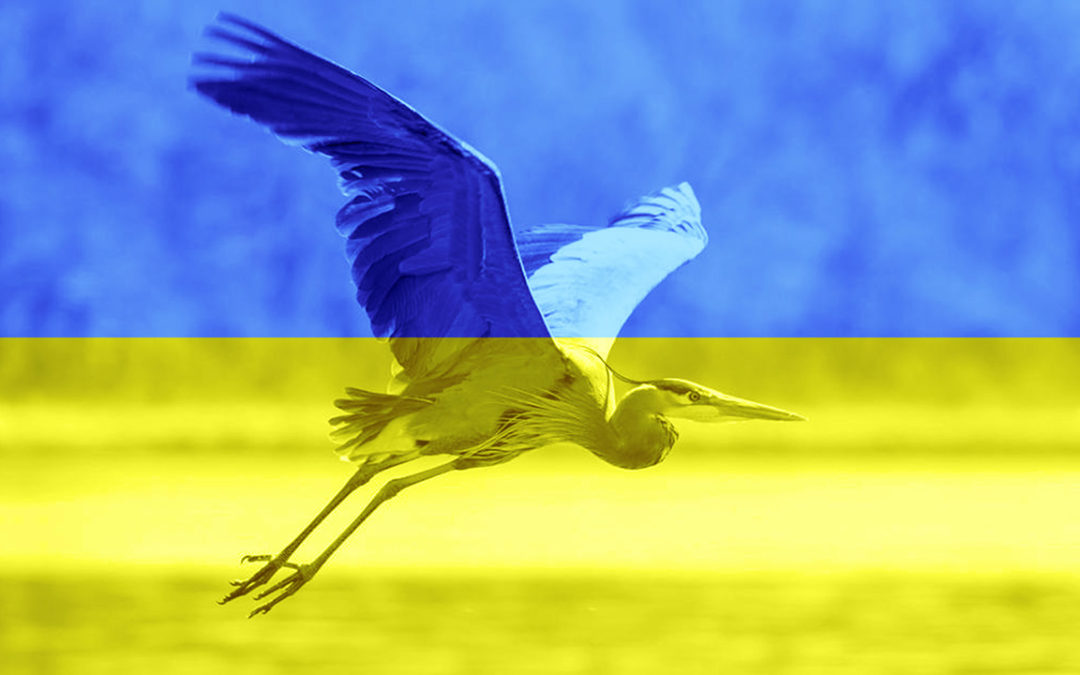
by Robert Bowie, Jr. | Mar 8, 2022 | Poetry, Politics
The delicate interdependence that is nature also protects democracies. But it is difficult to recreate once eradicated.
The Heron
A tall shadow controls my autumn pond.
It moves on long legs and will stare and wait.
After the late March ice had come and gone
And the exchanged songs of the frogs that mate,
The lily pads rise through the clear water
To shelter the colonies of black tadpoles
That are born as eggs, like pupiled eyes, pure,
And, like the rest here, uncompromising souls.
The summer heat reveals the baby fish
Spawned by the survivors of last winter.
By August it is like my winter wish:
Blooming like some Eden, ready to enter.
The heron knows nothing of what I mean.
By noon it will have picked the pond all clean.
“Week 38” from An Accidental Diary
(Available now on Amazon in paperback and Kindle.)
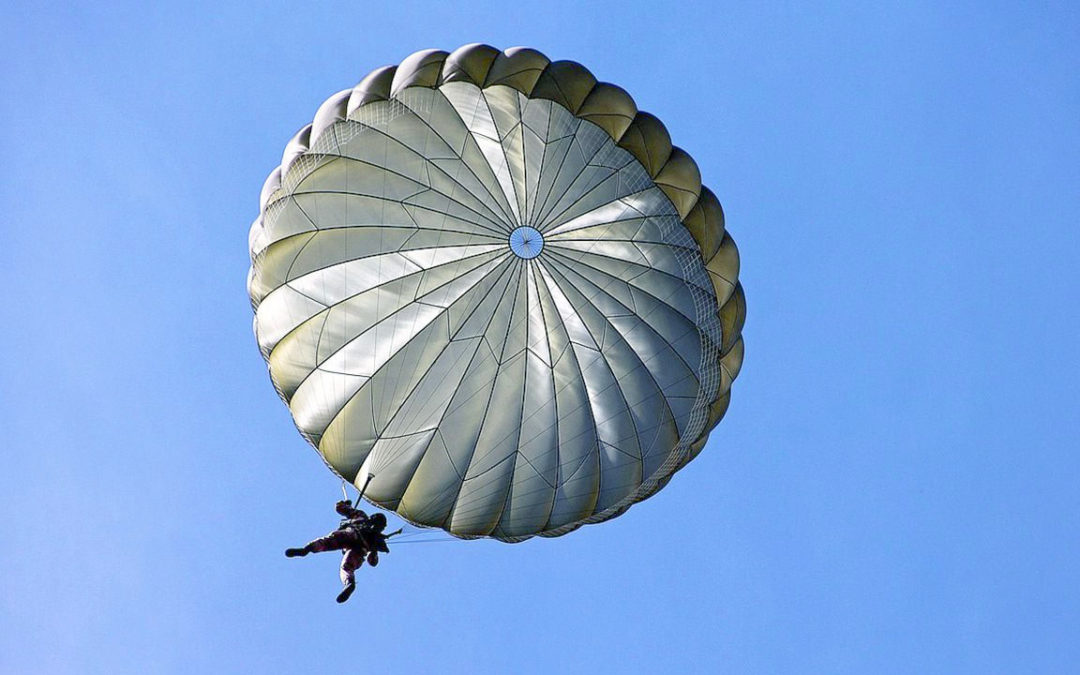
by Robert Bowie, Jr. | Mar 1, 2022 | Featured, Personal
Last week, I posted about my first parachute jump with my wonderful and crazy lost friend Haven.
But here is the rest of the story…
About ten years after my jumps with Haven, I told the story during lunch at the law firm where I worked.
As I finished, a few members of the staff and two associates unexpectedly got up and left. They came back about 10 minutes later with an announcement.
There was a parachute place on the Eastern shore of Maryland just across the Bay Bridge, about two hours away and, if I wasn’t a coward or just a B.S. storyteller, they would go next Saturday with me. But only if I would do the first jump.
That night, my wife just shook her head, looked at me in disbelief and said, “At least you don’t have any children.”
Because of my luncheon bravado, I was now a fool following myself down a path I did not want to follow… but it got worse.
The following Saturday, eight of us piled into two cars and drove down to “Parachutes Are Fun,” which looked a lot different than the professional business in Massachusetts where I first jumped.
Parachutes Are Fun featured one single engine plane with all the seats removed except for the pilot’s, a barn, and a school bus that had no tires and was up on cinder blocks.
As if launched from the bus, an overly excited prematurely-aged young man with wild blond hair and dilated pupils approached us. He looked like a stunt double for the old guy in “Back to the Future.” He held a helmet in one hand and a lit cigarette in the other and couldn’t stop welcoming us even before we got out of the car.
At the same time, the owner came out of the barn, dressed in a bombardier’s jacket with Parachutes Are Fun stenciled on the back, carrying a walkie-talkie. Behind him was as an assistant leading four people with parachutes on their backs to the little plane as a pilot in blue jeans, a baseball hat and sneakers was entering the cockpit of the plane.
This was way too informal! This was not good.
It was too late to change directions and forever be the coward who turned around and for once in his life had been responsible.
We were divided into two groups of four based solely on the car in which we came, and I was volunteered to be in the group that would jump first.
The character from the bus enthusiastically showed us how he packed the parachutes and couldn’t stop promoting as he did. He was excited to tell us he lived in the bus and loved his job so much that he took his raises and bonuses in free jumps.
Our new friend who lived in the bus took off with every plane and was responsible for everything from our chutes being packed properly to cursory instructions about the emergency chute if the primary shoot “perhaps” didn’t open, as well as coordinating the open door jumps from the plane that had taken off as we had entered.
As the plane circled overhead, the owner turned on his walkie-talkie and watched as the first diver spreadeagled at about 2,500 feet above us . The chute opened and the owner barked into the walkie -talkie, “Pull your left toggle”… “Reach up and PULL YOUR LEFT TOGGLE,” and then turned to the assistant and yelled, “That son of a bitch loaded them in in the wrong order again, dammit! I’m talking to somebody who hasn’t jumped yet!”
The clueless diver was drifting, arms at his side, downwind at a high rate of speed toward northern Virginia.
The owner shoved his hand into his pocket, threw a set of car keys to the assistant and told him, “follow the bastard and pick him up where he lands!” Three jumps later, the plane taxied down the dirt road runway to the barn to reload as the jumpers landed helter-skelter in the surrounding soybean fields.
I concluded this chaos was all a very good sign.
I had strategically decided to show no fear and thus as the others saw the disorder around them, the fear would gather in them and they would decide to go home. But when I finally decided to make eye contact in preparation for supporting their decision, I was shocked to find that they didn’t have a clue because they thought all this was normal.
Before I knew it, I was on the plane sitting on the floor next to the open door as we took off. It didn’t help me to feel any better that I could hear the guy with the walkie-talkie in communication with the assistant as he tried to follow a parachute in his car, zigzagging through highways and byways while trying to keep his eye on a disappearing spot in the sky. I considered the children and family I would never have.
I am vain enough to not ride roller coasters because I don’t want that as the cause of death in my obituary. As we rose higher and higher in the sky and waited to jump, I decided I wanted to be remembered, if at all, as the fearless, selfless, courageous parachutist who had advised the other three jumpers who would jump after him that if by some chance the walkie-talkie failed they could pull the toggles to face the wind in order to drop slowly straight down rather than have their backs to the wind and end up dead in some unfamiliar state.
The following week, late one afternoon, two of the people who had jumped with me came into my office laughing and holding The Evening Sun.
They had five copies open to a series of pictures and a headline that read, “Eastern Shore’s ‘Parachutes Are Fun’ Shut Down as America’s Most Dangerous!” There were several pictures of skydivers stranded on rooftops or hanging from high tension wires, as well as a beaming portrait of our friend who had just been evicted from the bus.
Slowly, as I reach maturity and a belief in evolution, I thank God for my children and grandchildren and that their mother’s DNA has prevailed.











